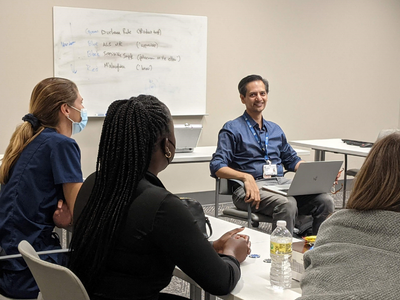
Protected time for didactic learning (“Academic Half-Day”) takes place on Tuesday afternoons throughout the entire four years of training. Academic Half-Days consist of several components, including courses, weekly conferences and site-specific conferences. We aim for a mix of a class learning as a cohort and inter-class educational experiences.
Academic Half-Day
Academic Half-Day courses address key topics in residents’ development as psychiatrists, ranging from systems to various psychotherapies to ethics. They vary in length from one to twelve months. See below to learn about the specific curriculum for each year of the residency.
- Acute Care Interviewing
- Behavioral Agitation Management
- Clinical Skills Verification Exam
- Electroconvulsive Therapy
- Structural Competencies
- Evidence-Based Medicine Boot Camp
- Foundations of Psychiatry
- Geriatric Psychiatry and Aging
- High-Yield Psychiatry
- Human Development
- Intern Process Group
- Mindfulness and Burnout
- Motivational Interviewing
- Patient Safety/Quality Improvement Series
- Pharmacology Jeopardy
- Psychotherapy in Acute Care Settings
- Residents as Teachers
- Secondary Trauma
- Site-Specific Clinical Introductory Series
- Approaches to Inpatient Opiate Use Disorders
- Art of the Psychiatric Consult
- Biological Psychiatry (BIOPSY)
- Clinical Skills Verification Exam
- Cognitive Behavioral Therapy
- Community and Social Psychiatry
- Social Determinants of Mental Health
- Evidence-Based Medicine Course
- Dialectical Behavior Therapy Skills
- Foundations of Psychotherapy
- Introduction to Acute Care Child and Adolescent Psychiatry
- Law and Psychiatry
- Orientation to Outpatient Psychiatry
- Patient Safety/Quality Improvement Series
- Pediatric Collaborative Care
- Pharmacology Jeopardy
- PGY2 Process Group
- Sexuality and Gender
- Acceptance and Commitment Therapy
- Approaches to Inpatient Opiate Use Disorders
- Attachment and Trauma
- Biological Psychiatry (BIOPSY)
- Career Series I
- Clinical Skills Verification Exam
- CME and Lifelong Learning
- Cognitive Behavioral Therapy
- Continuous Case Conference (Psychodynamic/CBT)
- Dialectical Behavior Therapy
- DukeLine and Text Psychiatry
- Finance for Physicians
- History of Psychiatry
- Interdisciplinary Approaches to Trauma
- Introduction to Psychodynamic Psychotherapy - Technique
- Outpatient Addiction Psychiatry
- Palliative Care and Psychiatry
- Patient Safety/Quality Improvement Series
- Psychiatric Ethics
- Psychodynamic Psychotherapy I
- Psycho-oncology
- Scientific Writing
- Accelerated Experiential Dynamic Psychotherapy
- Advanced Topics in Addiction Psychiatry
- Advanced Topics in Community and Social Psychiatry
- Advanced Topics in Psychiatry
- Capstone
- Career Series II
- Clinical Skills Verification Exam
- Consolidations of Psychiatry: PGY4→1 teaching experience
- Continuous Case Conference (Psychodynamic/CBT)
- Eating Disorders
- Effective Teaching in Psychiatry
- Intensive Short-Term Dynamic Psychotherapy (ISTDP)
- Neuroscience, Philosophy, and Psychotherapy
- Perinatal Psychiatry
- Prescribing Wisely
- Psychodynamic Psychotherapy II
- Research Literacy
- Safety Event Review Series/QI
- Systems-Based Care
- QI (Incident Review, PDSA Cycle Project Review)
- Residency Elective Fair, Residency Retreat
- Special Residency Education Days, including:
- Residency Education Contest (examples of past winners: Climate Psychiatry, Global Mental Health, Physician Vulnerability)
- CAP Speaker Series
- History of Duke and Durham
- EBM Boot Camp
Weekly conferences include:
- Chief's Conference: includes introduction series for interns, career series for all residents, special education topics with mental health providers from around North Carolina (AHEC)
- Med-Psych Conference
- Psychiatry Grand Rounds
- VA Evidence-Based Medicine Conference
- Site-Specific Educational Conferences (e.g., Journal Club, Interview Rounds)
Duke also provides many opportunities for interdepartmental collaboration and committee participation for interested residents.